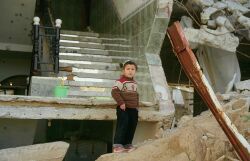27 September 2006
Abu Saleem, his 'Blessed' Olive tree - Al Mabroukeh and Palestine
Behind the Wall – "The Blessed One"By Richard Wiles [email protected]
Palestine is steeped in symbolism. The four colours of the Palestinian
national flag, red, white, green and black are those of many Arabic nations
but their national symbolism here in Palestine is not shared by all the
other states. The red represents the blood of the martyrs, the white purity
and love for all people, the green symbolizes the land of Palestine and the
black infers strength and solidity. But flags and colours are not the only
important signs of national symbolism, the country's flora and fauna also
carries a deeper meaning. Much as the Cedar tree is strongly associated
with Lebanese culture and history so the Olive tree is deeply entrenched in
all that is Palestinian.
For Palestinians the Olive tree holds much significance in the very soul of
this country. It is seen as a sacred tree due to Koranic and Biblical
references through which the olive branch is widely regarded as a symbol of
peace. It is also known to represent life, longevity and survival – the tree
can grow and live in happily in any of the country's environments or
climates much as the people will flourish in every corner of Palestine. The
trees' roots grasp the earth tightly and resiliently in the same way the
people will always fight to hold on to their land and their country. Simply
put, Palestine would not be Palestine without the Olive tree.
Historic Palestine, that is to say Palestine before the creation of the
State of Israel, stretched from the Jordan River to the Mediterranean. The
1947 U.N. Partition Plan gave 52% of this land to the Zionist state. By 1967
Israel's continuous land grab policy had left just 22% of Historic Palestine
to the Palestinians. With current settlement expansion and the building of
the Apartheid Wall there is now only around 12% left. As more and more land
is stolen and ever greater numbers of Palestinians become refugees so more
and more Olive trees are uprooted, chopped down and destroyed.
The finest Olive Oil in the country is widely accepted to come from Beit
Jala, in fact many people claim it is the best in the entire world. The Abu
Aisha family has cultivated and nurtured Olive trees on their land in Beit
Jala for far longer than any living person can possibly remember. Their
trees have been handed down through the family from generation to
generation. Abu Saleem is now 85 years old and can still remember his
Grandfather recounting the stories that his Grandfather had told him as a
child about tending their trees. The Abu Aisha family land in Beit Jala is
thought to hold trees that date back to the Roman times such is the
longevity of the Olive tree. There is one tree in particular that is the
biggest of them all and was always thought to be the oldest:
"I remember working in the fields as a child with my father and Grandfather.
Everyday we would sit under that tree to drink our coffee and eat bread. My
Grandfather talked a lot about that tree and made me solemnly promise that I
would always look after it and protect it."
It was known as 'Al Mabroukeh', or 'The Blessed'.
Abu Saleem has tended and loved these Olive trees for all of his life. If
you ask him when this began his answer demonstrates his deep attatchment:
"From the day I was born!"
He talks with such passion about his family's Olive trees, but it clearly is
not just talk, you can also see it in his eyes:
"The roots of these trees are my family's roots, these trees are our
history. They have lived through Roman times and Turkish times, they have
lived through everything. The trees and their history make me breathe, they
gave us all life. They are our history and I must always protect them."
Despite the sturdy nature of Olive trees Abu Saleem recalls the dedicated
hard work that he has put in throughout his life caring for them:
"I have weeded around the trees and ploughed the land in which they grow. I
have trimmed the branches and removed the dry ones. Before the winter rains
came I would build and restore stone walls and fences to prevent soil
erosion. These trees take more care and love than your own son!"
But one day in 1993 Abu Saleem was not there to protect his beloved Olive
trees. The I.O.F. came down with heavy machinery, bulldozers and diggers.
They were preparing land for the creation of the infamous Route 60, a
Settler only road that clearly illustrates Israel's Apartheid policy. This
road was being built through the West Bank to link up the illegal Israeli
Settlements built on stolen and occupied land. Nearby they were also
building a much lower quality Palestinian road so the Settlers had fast
access to the Settlements and ensuring that the Settlers would never have
the indignity of sharing a road with Palestinians. (Currently Route 60 is
open to shared access for both Palestinians and Settlers but a new
Palestinian road is again being built to reinstall the Apartheid road system
in the southern West Bank.) Abu Saleem had 24 dunums of land in Beit Jala
and 406 Olive trees on the land. On their first day of 'work' the IOF
ravaged his land destroying many of his trees. By the time he heard about it
and got down to his land early the next morning it was already too late for
nearly 100 of his trees. They lay strewn across his land like discarded
corpses. He remonstrated with the soldiers, argued, and finally begged them
to spare his trees, but he was told:
"This is OUR land and we must take it."
Many other local landowners came down to support Abu Saleem and eventually
the soldiers offered him a deal. They told him they would bring trucks and
move the trees across to his other land where he lives, alongside Aida Camp,
so he could replant them there. In total they dug up 191 of Abu Saleem's
beloved Olive trees, over a thousands years of life and history removed in
just a few short days. They did transport them across to his land next to
the Camp, but around half of them were beyond replanting, these were the
trees that had been unceremoniously ripped from their land on the first day
and were now useful for nothing but firewood. They had stolen what land was
needed for the construction of their Apartheid road system.
But this was not the last of the destruction of Abu Saleem's trees and the
theft of his land. They had built their road, which is still being used
today, but he continued to care for his remaining trees on the land and also
the ones he had now replanted in the land next to his home adjacent to Aida
Camp. He continued this work for over ten years before the I.O.F. returned,
but this time they wanted 'Al Mabroukah'…
In 2004 the soldiers once more came for Abu Saleem's land and his trees. It
was not a road that was being built this time but another more recent
ominous symbol of Israeli land theft and apartheid, the Apartheid Wall.
Again the bulldozers came and began to rip up Abu Saleem's land but he was
there this time:
"When I saw the bulldozers again crushing my trees it was like I was drunk
without drinking, it was like a horrible dream. I really couldn't believe
what was happening."
Abu Saleem again protested and argued with the soldiers but couldn't get
them to stop. He knew they would eventually get to 'Al Mabroukeh' but he
could never this happen, he had made his promise all those years ago to his
Grandfather and he intended to keep it. He stood by it all day long and then
night came but the soldiers didn't stop working. He knew he would have to
spend all that night there and as many future nights as it took to keep his
promise and preserve at least some of his family's history:
"I stayed by that tree all night. I didn't sleep, I just sat under it. The
bulldozers worked all night and the soldiers were all over my fields but I
wouldn't leave 'Al Mabroukah'. I had all my documents with me and I screamed
at them 'this is my land, I have all the papers. These are my trees!'. They
dug up many of my trees that night but they did not get 'Al Mabroukah'."
The following day after a heartbreaking and sleepless night Abu Saleem was
glad to see neighbouring landowners again come to support him. Some
internationals also came this time and eventually their joint protests
stopped the soldiers work. They left and moved onto neighbouring land.
In the face of military might and heavy machinery Abu Saleem simply could
not save all his trees. The pain ate away at him watching his family history
and its roots being destroyed, but through it all he never gave up on his
promise to his Grandfather. Most of his family have now died and many of
their roots - their trees, have also died, or rather been killed by the
I.O.F.. He was determined this would not happen to his sacred tree. He was
prepared to die for 'Al Mabroukah' if it came to it. Fortunately it didn't.
Abu Saleem and his sacred tree live to fight another day. And his struggle
for his trees has embodied the symbolism of the Olive tree with his
longevity, his resilience, his survival and his life. Long may it continue…

